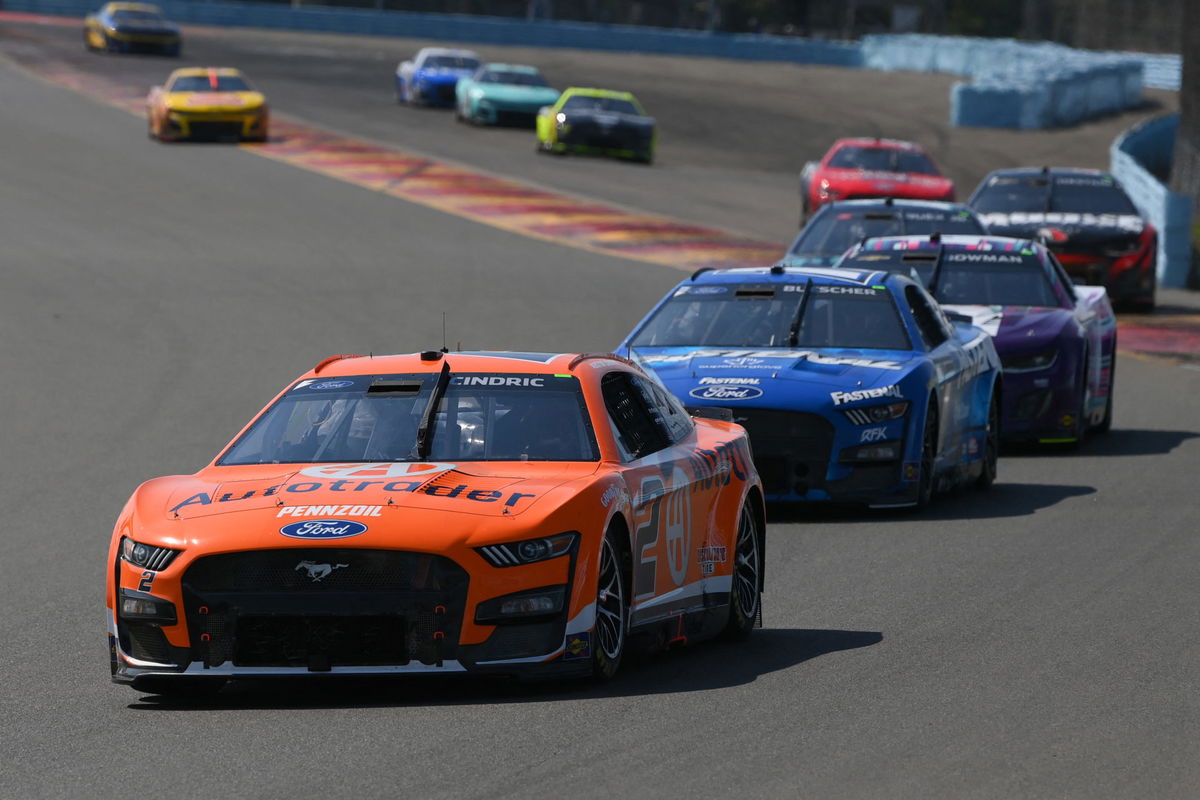
USA Today via Reuters
Aug 20, 2023; Watkins Glen, New York, USA; NASCAR Cup Series driver Austin Cindric (2) leads a group of cars during the Go Bowling at The Glen at Watkins Glen International. Mandatory Credit: Rich Barnes-USA TODAY Sports

USA Today via Reuters
Aug 20, 2023; Watkins Glen, New York, USA; NASCAR Cup Series driver Austin Cindric (2) leads a group of cars during the Go Bowling at The Glen at Watkins Glen International. Mandatory Credit: Rich Barnes-USA TODAY Sports
It seems like NASCAR has come under fire once again. The sanctioning body has been accused of favoring championship-eligible teams after inconsistently applying its Damage Vehicle Policy over the past month. Talladega Superspeedway saw the biggest crash in NASCAR history, with 28 cars being involved in the incident with five scheduled laps remaining. However, in a significant change from its rulebook, NASCAR allowed cars to continue the race after a brief stop at the pit road.
Watch What’s Trending Now!
What brought about this sudden shift in policy? Why didn’t NASCAR apply the same approach when Josh Berry was forced off at Kansas Speedway at the Hollywood Casino 400? There were plenty of questions raised after the 2024 YellaWood 500, with unlikely allies coming together to demand accountability from the sports hierarchy.
ADVERTISEMENT
Is NASCAR favoring playoff teams?
Absolute carnage. That’s the best way to describe the ‘Big One’ at Talladega Superspeedway. Cars were strewn across the 2.66-mile oval with plenty being immobile after the incident. Chase Elliott, Chase Briscoe, and Harrison Burton were amongst them, suffering from flat tires and were unable to drive back for some much-needed repairs. According to NASCAR’s DVP policy, their races should have ended, just like it did for Ryan Blaney and Josh Berry in the past month. However, title contenders Elliott and Briscoe were towed back into the pit road, after which they were allowed to continue the race.
Contact at the front of the field, and multiple #NASCARPlayoffs drivers are collected. pic.twitter.com/DoefQLRTOe
— NASCAR (@NASCAR) October 6, 2024
The inconsistent application of NASCAR’s Damage Vehicle Policy brought about strong reactions from racing team members, with Adam Stevens, who serves as Christopher Bell’s crew chief, having the strongest words. He said, “The rule has been if you are involved in an incident and you can’t drive it back, you are out of the race.” He then went on to say, “This weekend, that wasn’t the case and there was nothing communicated to me, my team, or anyone within the walls of Joe Gibbs Racing that it was going to change. That doesn’t seem right. It doesn’t sit right with me that it just changed on the fly that something seemed to change.”
ADVERTISEMENT
Stevens wasn’t alone in his views, as Kaulig Racing president Chris Rice also urged NASCAR to show some more consistency, saying, “My thoughts are we need to do it the same way every week.” However, Kyle Busch’s crew chief Randall Burnett shared a different perspective, highlighting that the sanctioning body was put in a difficult position, as 28 cars being involved in an incident during a high-stakes race is unprecedented. Josh Berry particularly felt hard done by after NASCAR’s change in approach, especially since the organization’s decision cost him valuable points at Kansas Speedway.
During the 2024 Hollywood Casino 400, Berry’s No. 4 Ford Mustang was forced to retire after a lap one incident despite his car having little to no damage. The Stewart-Haas Racing driver could have carried on after a brief pit stop, but NASCAR towed his vehicle into the campgrounds even though the 33-year-old refused to leave. He wasn’t the only driver who was unhappy with the outcome at Talladega, as Joey Logano also criticized the sanctioning body for inconsistently applying its DVP towing process, going as far as calling it “comical”.
ADVERTISEMENT
Top Stories
Teresa Earnhardt Triggers Fans as Dale Earnhardt’s Unearthed DEI Relics Go Public
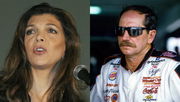
Richard Childress & Johnny Morris Make Patriotic Power Moves Days After Causing NASCAR’s Collapse in Courtroom
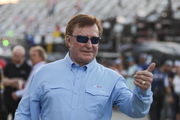
What Is NASCAR’s 5-Strike Rule That Could Change Its Future? Check All Details Here
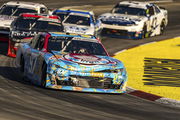
Rick Hendrick Strikes Fear in NASCAR Fans With Chevy’s New “Illegal” Car
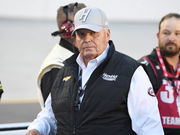
New Charter Deal Triggers ‘Financial Frenzy’ as NASCAR Teams Set for Massive Payday
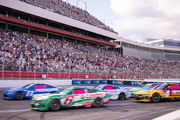
Elton Sawyer shares the rationale behind altering the DVP
As expected, there was a tremendous backlash because of NASCAR’s inconsistencies at Talladega Superspeedway, prompting its hierarchy to share their view about the situation. Highlighting that the sanctioning body didn’t want to sideline capable cars during a high-stakes race, Elton Sawyer, senior vice president of competition said that the spirit of the rule continued to be applied at the 2024 YellaWood 500, even though they took a “competitors first” approach.
Speaking after the race, Sawyer said, “Our goal from day one was not to put good cars or trucks out of the race, and the way we’ve executed that over the past three years; the policy hasn’t changed. There have been times that we have towed vehicles to pit road to correct their issue.” He went on to say, “The cars we towed back were able to make those modifications and made it back on track and met minimum speed, so yeah.”
ADVERTISEMENT
In many ways, Elton Sawyer’s comments don’t answer the underlying problem NASCAR teams have when it comes to implementing the DVP. The pressing issue is the inconsistent application of the rulebook, which seems to be favoring teams that are competing for the championship. Josh Berry’s No. 4 Ford Mustang could have also met minimum speed at Kansas Speedway but wasn’t allowed to get back into the pit road. If the sanctioning body is going with a ‘competitors first’ approach, it should be applicable across races and irrespective of playoff status. That would go a long way in showing drivers and teams that there isn’t an underlying bias involved when it comes to interpreting the rules.
ADVERTISEMENT
ADVERTISEMENT
ADVERTISEMENT

